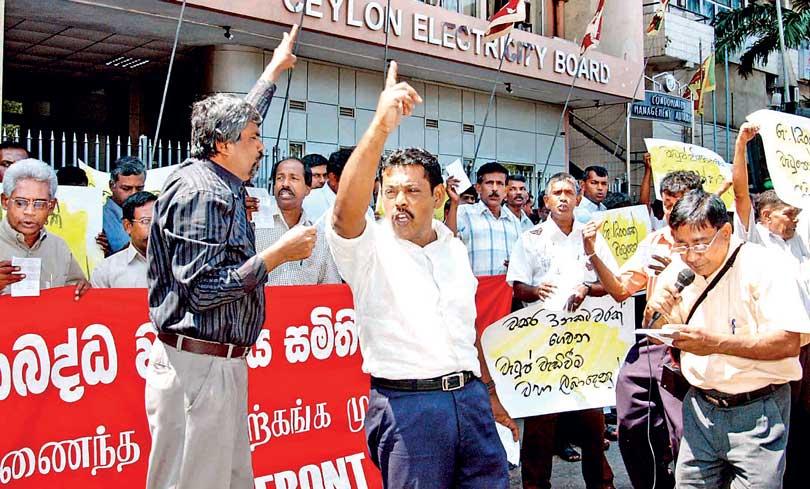04 Jan 2024 - {{hitsCtrl.values.hits}}

Employees of the Ceylon Electricity Board are seen staging a protest demanding the salary revision that takes place once every three years
 It has been reported recently that Minister of Power and Energy Kanchana Wijesekera has given instructions to withhold bonuses and other allowances to employees of the Ceylon Electricity Board for the year 2023. However, according to Rusiripala Thennakoon, the former Bank of Ceylon Chairman, bonuses and other allowances had been withheld not only for CEB employees, but also for all government institutions.Therefore, he added that issuing a separate statement declaring the withholding of bonuses or allowances for any specific government institution is unnecessary. This article is derived from a discussion with him.
It has been reported recently that Minister of Power and Energy Kanchana Wijesekera has given instructions to withhold bonuses and other allowances to employees of the Ceylon Electricity Board for the year 2023. However, according to Rusiripala Thennakoon, the former Bank of Ceylon Chairman, bonuses and other allowances had been withheld not only for CEB employees, but also for all government institutions.Therefore, he added that issuing a separate statement declaring the withholding of bonuses or allowances for any specific government institution is unnecessary. This article is derived from a discussion with him.
 No bonuses or allowances were disbursed this time owing to the recent circular instructions from the Ministry of Finance pertaining to collective agreements between the government and trade unions. This has triggered controversy within certain segments of the labour sector. Some influential trade unions in the country are already prepared to take action regarding this matter. However, critics opine that a thorough analysis of the reasons behind this decision should be carried out.
No bonuses or allowances were disbursed this time owing to the recent circular instructions from the Ministry of Finance pertaining to collective agreements between the government and trade unions. This has triggered controversy within certain segments of the labour sector. Some influential trade unions in the country are already prepared to take action regarding this matter. However, critics opine that a thorough analysis of the reasons behind this decision should be carried out.
Within the organised trade unions, a tradition has been established of reaching a labour agreement every two years; a practice that has been in place for some time. As a result of implementing this system, it seems that government intervention has taken place based on issues that have nationwide influence on salaries. According to the latest instructions issued by the government the primary focus is on public sector institutions. Firstly, the instructions provided by the Secretary to the Treasury through the Public Enterprise Circular No. PED 03/2023, dated 17-11-2023, was sent to all Secretaries to Ministries, Chairmen of Commercial Corporations, Statutory Boards, and Government-Owned Companies for the purpose of them being taken into consideration.
According to this circular it is evident that the relevant instructions have been issued in line with a decision made by the cabinet, as per Cabinet Memorandum NO. 23/1902/604/188 dated October 9, 2023. The cabinet has decided to appoint a committee to review the existing signed Collective Agreements of State-Owned Enterprises (SOEs)-representing all relevant parties- and to make recommendations on addressing the related issues. The circular specifies certain actions which should be temporarily suspended until further directives are issued based on the recommendations of the aforementioned committee. These actions include the initiation of new Collective Agreements by the SOEs and the extension or replacement of existing Collective Agreements of SOEs. It is emphasised that these directives must be strictly adhered to by all boards of directors of SOEs with immediate effect. In this context, the background of collective agreements, the applicable concepts and the existing statues on the matter should be taken into consideration. The primary foundation of collective agreements with trade unions is the labour conventions declared by the International Labor Organization (ILO) from time to time.
Freedom of association, a fundamental human right, guarantees trade unions the right to effectively negotiate employment relations between workers and employers. Through the sound collective bargaining practices of these unions, it is recognised that both employees and employers have an equal voice in relevant discussions, ensuring fair and positive outcomes. Furthermore, collective bargaining provides an opportunity for both employees and employers to address the employment relationship; thereby establishing a foundation for avoiding labour disputes. Countries with well-regulated collective bargaining systems have demonstrated significantly lower wage inequality and fewer strikes.
Additionally, collective bargaining policies can contribute to the success of campaigns aimed at overcoming a financial crisis in a country. By utilising existing ILO standards it is possible to promote collective bargaining and build positive labour relations that benefit everyone. Starting with the C001 - Hours of Work (Industry) Convention, 1919, and extending to the R207 - Safe and Healthy Working Environment (Consequential Amendments) Recommendation, 2023 (No. 207), the current ILO conventions, specifically the Freedom of Association and Protection of the Right to Organize Convention, 1948 (No. 87), and No. 98 Right to Organize and Collective Bargaining Convention, are acknowledged as the two foundational agreements of the International Labour Organization. These conventions are highly regarded as key charter conventions for safeguarding labour rights. An inquiry into the current situation- related to these conventions- has sparked a significant conversation today.
When examining the responsibility of government-owned institutions, one of the direct stakeholders in the collective agreement process of these institutions is the top management. According to their recommendations, the Boards of Directors, and subsequently, the Treasury as the final approval authority, get involved. Consequently, in issues related to collective agreements, all these entities are bound together as a responsible party. In such cases, this responsibility is not solely assigned to the trade union movement.
Major malfunctions
There are typically two major malfunctions that occur in this context. Firstly, the benefits outlined in collective agreements often extend to the upper management, who actively participates in negotiations representing the ruling party. As a result, their involvement may be perceived as a form of biased support aimed at generating favourable outcomes, or a conflict of interest. In scenarios where the board of directors frequently relying on the guidance and recommendations of top management, any proposals presented for their approval seem to prompt the board to take action in a manner that avoids harming the goodwill of the top management and grant approval without thorough examination.
Afterward, during the submission of those recommendations to the Treasury for final approval, and considering the discretionary authority granted to the institutions along with the financial situation highlighted by the management, the treasury officers sign these recommendations based on the determination that the proposed collective agreements would not have a direct impact on the treasury. Several points should be mentioned about the other main party involved in the collective agreement process: the trade unions. While there is a possibility of strong objection to discussing these matters, under the right and freedom to express the truth, it is our duty to present the actual facts in the same way.
One of the main factors employed by government institutions to favorably enhance service quality and conditions is the numerical data that are shown as the profits earned by certain institutions. However, history has revealed instances in which the presented numbers and statistics were formed in seriously questionable manner. There are also cases where corruption and fraud were exposed later because of the carelessness or lack of support provided by the top management of some organizations. It has also been observed that, in such cases, organized trade unions operating in those institutions maintained a strong silence. Moreover, there have been instances where certain trade unions strongly objected to those who exposed such corrupt practices.
It is no secret that trade unions ought to be aware of the corruption and fraud that often occurs in organizations. However, it is evident that for these organizations, it has become important not to damage the goodwill of the top management; which is a crucial matter when entering into collective agreements. This situation has resulted in the continuation of corruption and fraud within institutions. It is unnecessary to elaborate on the serious disparities that may be present in the collective agreements entered into under such conditions.
Often, when entering into agreements the focus appears to be solely on obtaining pay raises and immediate special offers, disregarding important aspects such as ensuring good working conditions for the long-term benefit of the organization and its employees, as well as avoiding workplace difficulties. To achieve the goal of establishing working conditions and terms through the collective bargaining system and fulfill the highest objectives of the labour organization, it is crucial to conduct negotiations in front of an impartial and independent board. In some instances, even in sectors entitled to a monthly allowance, which increases regularly according to the rising cost of living index, there is a tendency to seek higher salaries, emphasising the cost of living.
A significant wage disparity is emerging and steadily widening between the unorganized sectors and the heavily organized sectors in our nation. The Treasury has the obligation to pay attention to the collective agreement proposals recommended by suppressing accurate information. Given this circumstance, it may be regarded as a timely initiative to conduct a thorough review of the pertinent subject through a cabinet decision.
Nevertheless, it is extremely important that the committee appointed for this purpose covers a wide range and consists of impartial people with experience. It is also important that the recommendations of that committee be given without delay. The need to introduce a national salary policy that covers the entire country’s labour force and employee community has become a major task for the government.
22 Dec 2024 2 hours ago
22 Dec 2024 2 hours ago
22 Dec 2024 4 hours ago
22 Dec 2024 5 hours ago
22 Dec 2024 5 hours ago